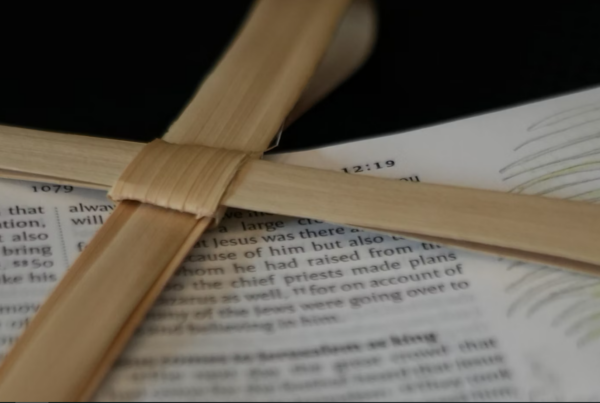Following Jesus doesn’t mean you’ll never face difficulty or suffering, it just means Jesus is with you through the hard times. The church often overlooks the discipleship work of preparing its people for difficulty as well as joy. Intergenerational relationships in the church can prepare members—especially younger members—for facing difficulty and suffering in their lives.
This material was originally recorded as part of the Renovations Project. It has been lightly edited and condensed for clarity.
Through my work with The Voices Project, I see people who are in the work of grassroots ministry, and who are doing really good, meaningful, powerful work in a variety of spectrums. But this is also hard and challenging and discouraging work. And I feel like in some ways, the modern church has not prepared them for hardness. It has not prepared them for suffering.
The church has not prepared its people for suffering
When I started hearing 30-year-olds talk about how they were experiencing burnout and they needed to take sabbatical, I realized that even though the sermons changed, the music changed, the worship changed, the expectations changed, I don’t think that the expectations of what the Christian life is supposed to be has changed.
We have not produced a church, a modern church, that is acquainted with grief, that knows how to endure hardness, that knows how to go through suffering. When you look at what the historic church went through and what Christians had endured willingly and deliberately for the sake of the gospel and to promote the person of Jesus, and if you compare it to the church that we have today, I don’t think the church would still exist if the modern church was what we had at the time of the historic church.
And so, there’s a need to let people know: I see you and know what you’re going through. And it is hard and it is painful, and I’m in that with you. Yet you still have to do it. And you can do it, because the power of God in you has given you the ability to do it if you are deliberate in tapping into that power, if you are honest and authentic about needing that power. If you are trying to do it on your own and in your own strength, you will fail and you will burn out, because you’re trying to do supernatural things with the ability of the natural, and that will not work, not long-term.
Related: Lament Toolkit: Understanding and Practicing Biblical Lament
Relationships build resilience to endure difficulty
I’ve had the privilege of working with kids and youth for a long time, and I’ve felt especially burdened and called to leadership development among urban youth. In that work, one of the things that I have tried to do pretty consistently was to start with talking about what was good and great in them and to tell them that I see that in them. That’s important for older leaders to start at that place—telling the youth, “You are beautiful and talented and powerful and creative; God has done that already in you. There are things that you have to offer to the world that no one else can do the way you can do it. And we need you to do it. We can’t do it. We need you to step up and lead us in doing this thing.”
If you are starting from that place and establishing relationship in that way, as you are working together, you’ll get the opportunity to walk with them through difficulty. Something hard happens, and maybe they’re ready to backpedal. And you have the chance to say that you don’t get to walk away because it’s hard. It’s going to be hard. It’s going to be painful. Not everybody’s going to like you. People are going to say something about you, and people talking about you is not really the kind of suffering they were talking about in the Bible.
When you have started from a place of you working together, then they’re able to hear that. Now, they may still not like the fact that you called out this fragility in them, but they don’t necessarily walk away from that. They will stay around to hear more and work together with you, and that’s what you hope for as an older generation.
Prophetic voice in the face of difficulty
My understanding of the prophetic gift is hearing before speaking.
There are people in every congregation who have that drive to get before the face of God and to hear what he is saying. What is he saying about the issues of our time? What is he saying about the things that we are going through? And then, these people have the faith to say what they heard and to share that. There is the need to say what is not always popular or political, but what is true based on our understanding of what the Word of God says. And that is still the role—that has always been the role—of the prophet.
I do believe from what we read in Scripture that prophets are called not necessarily to the nation, but to the leaders. God was always sending: “Go and tell X.” And that X was generally whoever was in leadership, the king or a leader in a religious area, but sent to the leader to say, “Thus sayeth the Lord,” and to provide that voice of accountability. The same is today. There are people who are seeing things happening, decisions being made in the church and outside of it every day, and they hear the Spirit of God saying, “Watch out. This is not good,” or saying, “Yes, this needs to be pursued. You need to go after that.” They have to be courageous and say, “This is what I’m hearing,” or, “Be careful. I don’t think you should do that.”
Related: Seeking Justice Is Central to God’s Calling for Leaders
Safeguarding relationships during disagreement and difficulty
This, of course, means that there’s some relationship with people in leadership and the willingness to say the hard things, even if people don’t like it, even if they don’t like you at that moment. And yet, that is the call. Hopefully, the church leaders see that there’s a need for that and make room for it, even if they don’t always like what they hear.
This is something my husband, Leroy, and I have had to navigate as we work in ministry together. The thing that works now for Leroy and me and the work that we do is that he is the innovator. He is going to come with the idea, but he knows if he’s coming to me, that he’s probably going to get pushback. I’m probably going to say, “No, I don’t think this is going to work,” or, “Why I think this needs to be done,” or, “Is that legal?” I’m going to ask the questions that are going to irritate and frustrate him at times, but he’s made room for me to do that. And I know that the end of the day, it doesn’t change our relationship.
And people need to feel that in the space of their churches as well. If you invite that prophetic voice, you’ve made room for that, and if there’s disagreement in the moment, it will not kill the relationship. Especially if the voices that are speaking are that younger generation, they need to know that you’re not going to cut off the relationship because you didn’t like what they said or it was hard or it didn’t feel good.

Renew your church’s imagination for ministry
The Renovations Project helps leaders learn, together.
- Thought-provoking masterclasses
- Personalized coaching
- Immersive visit to a ministry innovation hub
- Ministry innovation grants up to $5,000

Donna Barber
Donna Barber is the executive director and co-founder of The Voices Project, a national network for training and promoting leaders of color. She has been an educator, trainer, and coach for youth in urban areas for more than 25 years. Donna is author of Bread for the Resistance: 40 Devotions for Justice People. She participated in listening sessions about innovation hosted by the Reformed Church in America.



